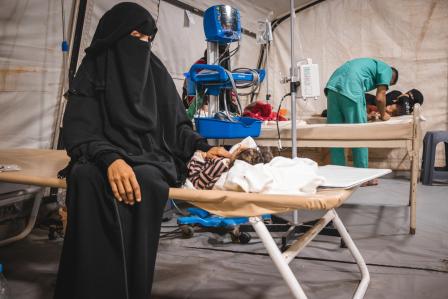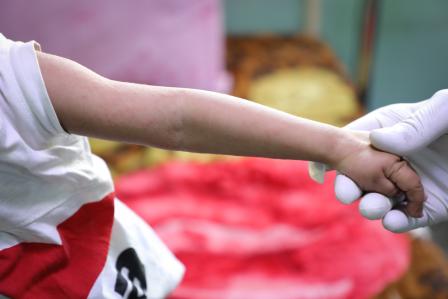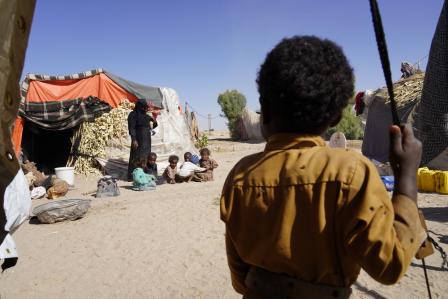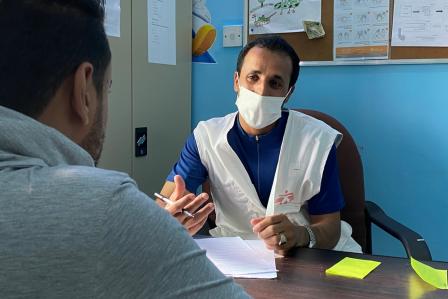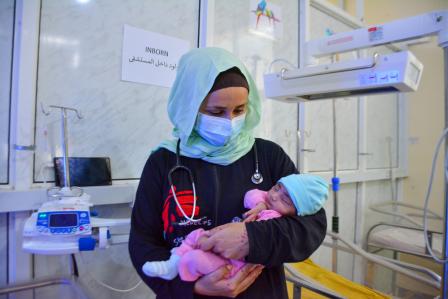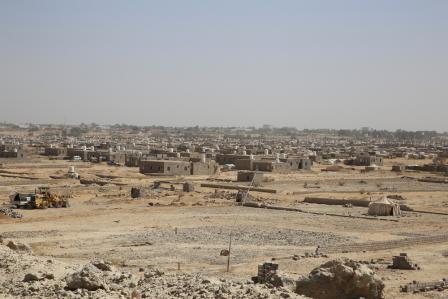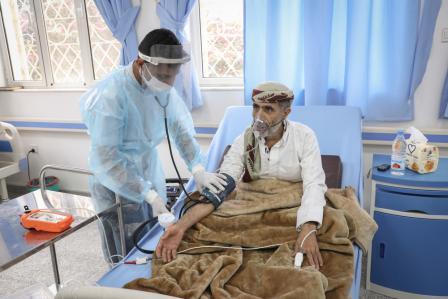Indiscriminate frontline hostilities and new sanctions are the latest addition to Yemen’s medical emergencies
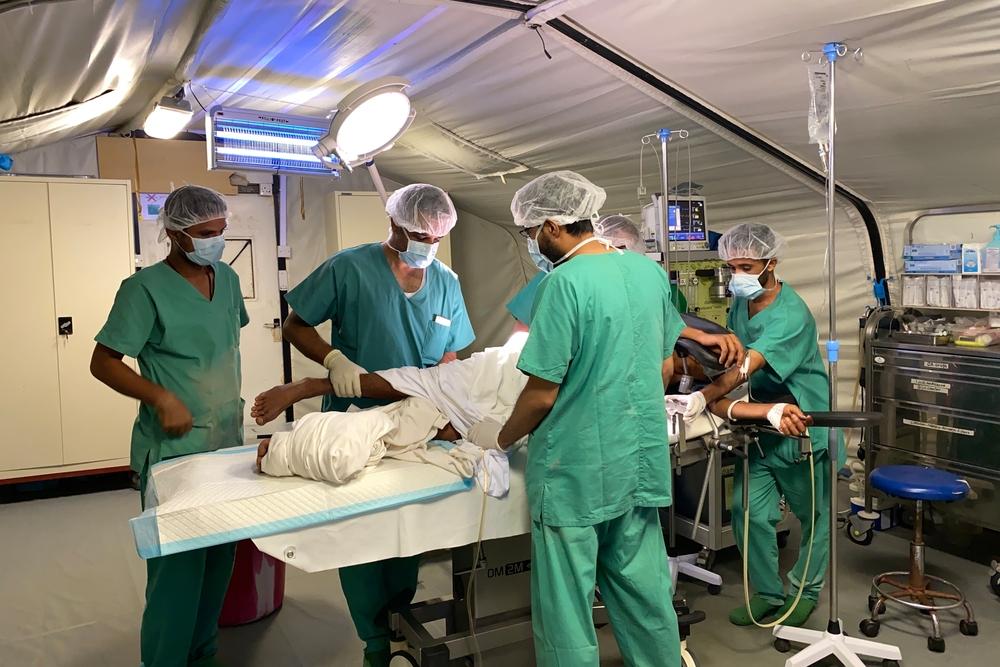
The Operating theatre at MSF’s trauma centre in Mocha, in the Red Sea Coast region of Yemen. The surgeons provide life and limb saving surgery for war wounded, traffic accident victims, and pregnant women needing emergency surgical delivery. Since late November 2020, the overwhelming majority of patients have been war-wounded civilians. © Hareth Mohammed/MSF
To the south of Hudaydah Port on Yemen’s Red Sea Coast, renewed conflict on the frontlines intensified at the end of 2020, and the number of civilians needing major war-trauma surgery rose to alarming levels. From October to the end of the year, the MSF trauma hospital in the nearby town of Mocha treated more than 120 war-wounded patients – with a drastic shift from late November when the vast majority of severely wounded patients were women and children.
“We treat everyone needing emergency surgery in our Mocha trauma centre—war wounded, traffic accident victims, and pregnant women needing emergency surgical delivery,” says Raphael Veicht, Doctors Without Borders/Médecins Sans Frontières (MSF) Head of Mission. “Killing and wounding civilians in conflict not only constitutes a severe violation of International Humanitarian Law. It goes further than that; our patients include children, pregnant women, breastfeeding mothers, and men working in a milk-bottling factory that was hit by shelling—and there is nothing that can justify this.”
Finance and aid
The picture people have of aid is the doctor attending to the patient, but it is much more than that: it is the plane that gets the doctor to the country; the bank transfers that mean her local colleagues can be paid; and the ship that brings the medicines and other medical equipment.
One person who is part of that bigger picture is Melvin Kaibigan, a Filipino field worker with Doctors Without Borders/Médecins Sans Frontières (MSF). He spent two years in Yemen as Finance Coordinator, or FinCo.
“When you say that you work with MSF, most people only think of personnel with a medical background. Most people don’t realize that there is finance and admin work involved. In any MSF mission, the finance coordinator is the one in charge of the mission treasury, which means we are in charge of the funds and the money that the project is using in each project. We have to make sure that there is enough money, so we can do all the activities, we can open hospitals, and we can pay all the salaries and all other expenses.”
The FinCo is a critical part of the operations of Doctors Without Borders/Médecins Sans Frontières (MSF). “We support the operations by providing financial analyses, so we normally report to the head of mission. We will alert them if there is an issue, and this helps in decision-making, especially on where to allocate the budget and if we want to open new activities.”
Supporting operations
Because of his role as FinCo, Melvin is familiar with the minute details of the operations in Yemen, and he recalls that the various emergencies to which MSF is responding in Yemen.
“In Kilo, Yemen, Doctors Without Borders/Médecins Sans Frontières (MSF) set up an operating theatre and organized the intensive care unit, the emergency department and the hospitalization service of one of the main hospitals. The teams performed an average of 80 surgical procedures per week, reaching over 4,000 during the year. We had over 6,000 emergency consultations, nearly half of were in trauma.”
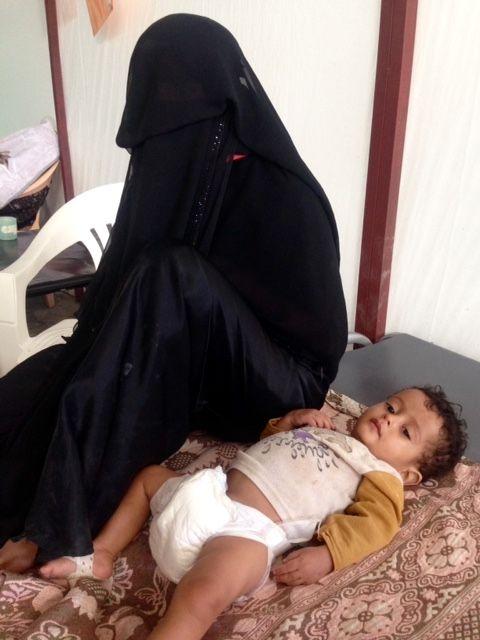
Fatima sits on the bed next to her 18-month-old son Ishaq, who is being treated at one of MSF's cholera treatment centres in Kilo, southern Ibb governorate. © MSF
Long before COVID-19 surfaced, other diseases such as cholera and diphtheria needed attended attention too. “Since April 2017, we have been responding to the cholera epidemic. Doctors Without Borders/Médecins Sans Frontières (MSF) set up treatment centres, and organized awareness-raising activities. Over 4,000 patients were admitted to Kilo cholera treatment centres. The teams also treated patients with diphtheria in two specialized treatment units. In the city of Ibb, a new emergency service has been opened in Al-Nasr hospital. The teams are setting up an ambulance referral system to another hospital or patients in need of vital surgery. In 2018, the teams managed more than 8,600 emergencies. At the end of the year, MSF began supporting emergency rooms and operating theatres in Al-Udayn and Far Al-Hudayn hospitals, located in a rural area along the main transit route for displaced populations.”
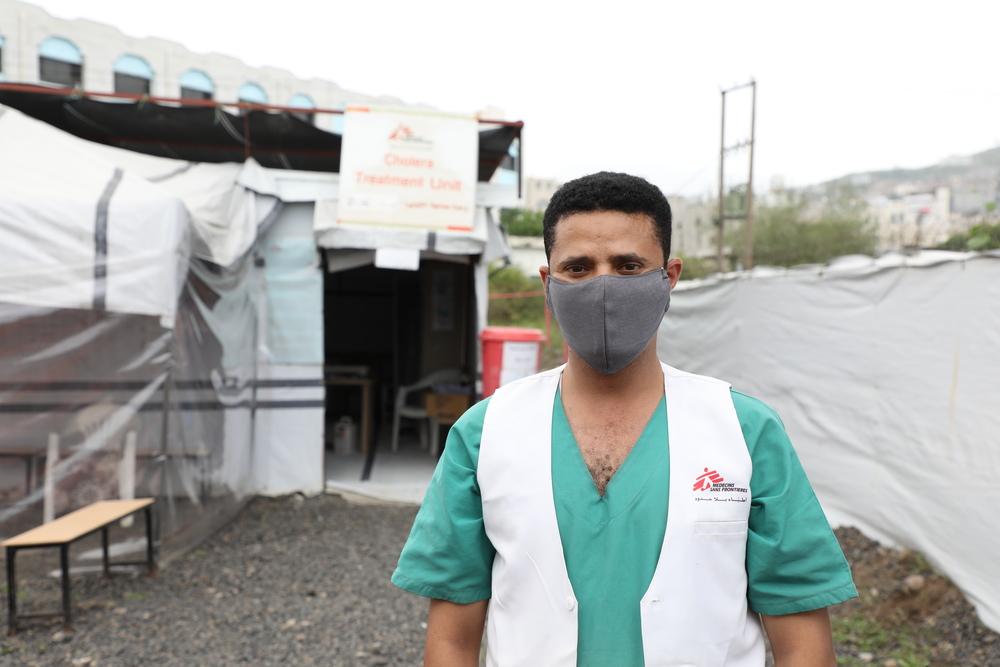
Fear of contracting COVID-19 in hospitals and of catching and spreading the disease are keeping people at home, even if they require medical care. People are waiting until they are very sick before they come to health care facilities. “As a member of the health promotion team in the cholera treatment centre here in Ibb, we try our best to educate patients about cholera, watery diarrhoea, symptoms and methods, and hygiene practices to prevent this disease, correct sterilization methods, and washing hands with soap and water regularly. We are here to serve the patient and our presence in the cholera centre for their sake and to provide health care in the fullest way,” says Ali Al-Nusaif who is a member of the HP team at the cholera treatment centre in Ibb, Yemen. © MSF
The intensified conflict in Hudaydah was only the latest in this series of emergencies. Melvin recalls what happened after exploratory missions assessed the health situation. “Doctors Without Borders/Médecins Sans Frontières (MSF) started emergency care and trauma activities in order to provide life-saving care, as close as possible to the frontline. The MSF team work in Al-Salakhanah Hospital in the city, where they managed the emergency department, the operating room, and the emergency unit. MSF also supported the blood bank and sterilization unit, and donated medical equipment.”
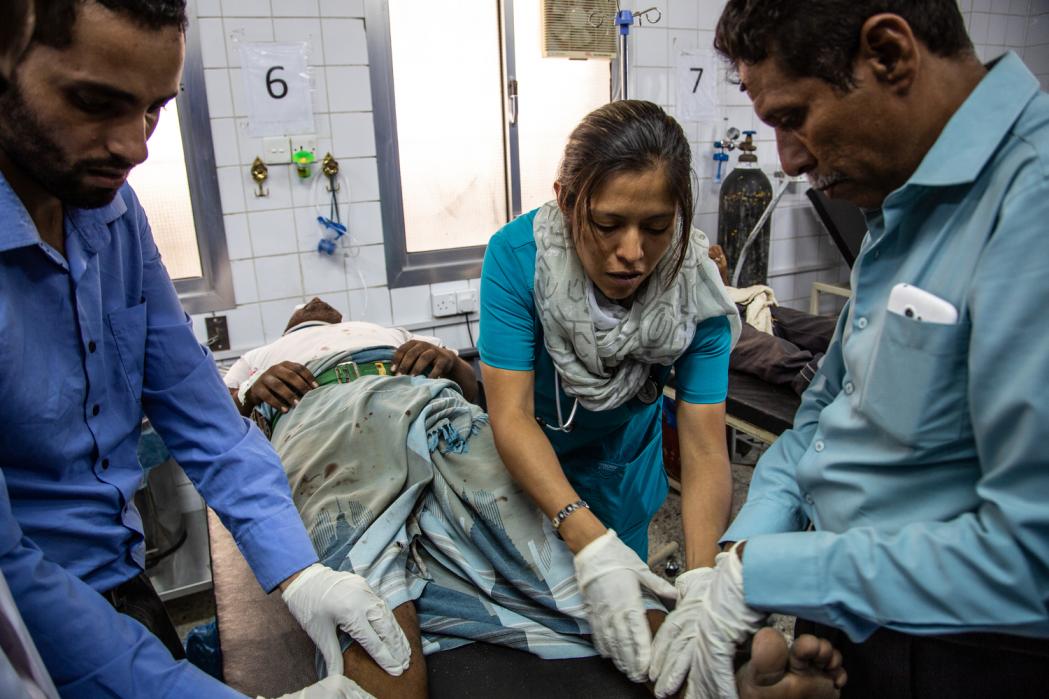
Yemen, Hodeidah, Al Salakhana hospital, April 2019: ER doctor Dr. Lupita Noria Garcia is examining a patient injured during a road traffic accident. © Agnes Varraine-Leca/MSF
Finance coordinators like Melvin need to be able to work, get visas, do bank transactions and pay staff in places like Yemen, so that organisations like Doctors Without Borders/Médecins Sans Frontières (MSF) can continue responding to medical emergencies all over the world.
Melvin Kaibigan worked as Finance Coordinator in Yemen for two years.

